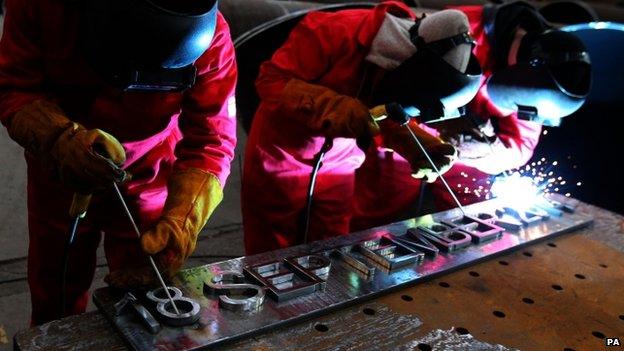Scottish independence: Taking stock a year before vote
- Published

A date with destiny? The Scottish independence referendum takes place on 18 September, 2014
Timing matters, in politics as in life. For the avoidance of doubt, those two - politics and life - occasionally coincide, more than the cynics would contend.
And so, with exactly a year to go to the referendum on Scottish independence, let us consider the calendar.
Let us ask, in particular, why there is still a year to go to that plebiscite.
You will find a rather different reaction to this day from the two broad campaigns which are seeking popular support in Scotland.
The advocates of Union tend to express exasperation. Why, they ask, are we still marking significant days, still holding debates, without sight of the prospectus for independence, the White Paper in which the Scottish government will set out its detailed proposals?
From Labour in the Scottish Parliament, you will hear expressed another frustration. They talk of "Holyrood on hold", a sole focus upon independence while, they allege, pressing matters such as poverty and inequality suffer relative neglect. A claim that is disputed.
The supporters of Union know the answers, of course. Alex Salmond is taking the longer view in pursuit of his carefully nurtured ambition of Scottish independence. Quite understandably from his perspective, as the leader of the SNP, he wants to maximise his prospects of victory.
Which brings us back to the calendar. Set aside the particular day for a moment. Shelve, for a second, thoughts of September 18. Consider rather the year and the season. Autumn 2014.
Alex Salmond chose that point in the cycle for three main reasons...
He calculates that the economy may be in somewhat better shape by then.
He hopes that the passage of time will diminish the impact of attacks upon independence, particularly in the financial field.
And he anticipates that his main rivals will be fighting each other by then in the run-up to the UK General Election in May 2015.
Ponder each in turn. Regarding the economy, the calculation is that people may be more disposed to give a hearing to independence if their financial anxieties have eased.
Remember, this is not an offer of independence in flight from London. It is not remotely like some independence movements elsewhere in the world which are predicated upon liberation from a loathed despot.
Primarily, it is a gradualist project, inviting people in Scotland to construct a revived state upon the foundations of pre-existing devolution. To build upon devolved success, in short.
Nationalist strategists calculate that, to get an audience for that, they require people to be relatively secure about the economy. Insecure people tend to tidy their house and dig the garden. They tend not to seek a new home.
Hence, we arrive at an apparent contradiction. Those who would end the UK's remit in Scotland rather welcome the signs, disputed admittedly, of a revival in the UK's economic fortunes.
I stress, "an apparent contradiction". It is easily resolved by considering that economic disquiet would undermine the independence offer which, to be clear, is also firmly founded upon positing an alternative economic programme to that of the UK government, predicated upon claims of a fairer approach.
Secondly, those economic attacks, including more today. The SNP hope is that people will steadily discount those, even as they become more numerous. In particular, they hope that voters will see some of these attacks as backfiring - such as the suggestion that mobile phone use would face difficulties and costs.
In which case, again with the passage of time, Nationalists hope to construct a narrative, probably focused upon Chancellor George Osborne and his UK ministerial colleagues. The syllogism runs thus - he got it wrong on x; his economic policies ("bedroom tax") et al are unjust; how can you now trust a word he says.
Sense of frustration
Thirdly, on timing, the UK General Election. The Nationalists are already looking for signs of disquiet in the Better Together camp, who want the Union to stay together. They will sharpen their gaze as the Westminster election approaches, on its new fixed timetable.
But, of course, the SNP's rivals will return the compliment. They, too, have issues with timing. They accuse their Nationalist opponents of constructing the narrative of a long, patriotic march to independence - without offering the detailed answers demanded by voters. (That claim is, needless to say, rebutted.)
Plus, of course, the chancellor and others contend that, far from being discounted, the economic challenges they pose will accumulate into a substantive case against independence and for the Union.
Again, though, there is that sense of frustration on the Union side with regard to timing. However, simultaneously, they know they must set aside their exasperation. If they are to win, they must not seem grumpy and petulant about a timetable which, ultimately, they permitted. (Remember that the PM said he was more concerned about the referendum question than the date.)
And so the Scottish Secretary Michael Moore hails this day as the beginning of a "challenging and exciting" year as the competing arguments emerge.
Twelve months to go.